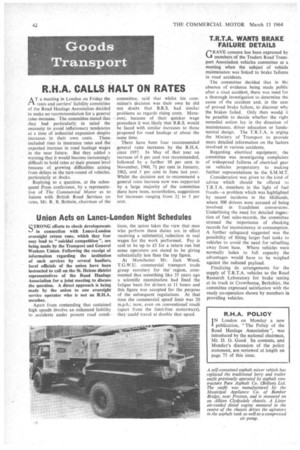Union Acts on Lanes-London Night Schedules
Page 44

If you've noticed an error in this article please click here to report it so we can fix it.
STRONG efforts to check developments NJ in connection with Lanes-London overnight return runs, which they fear may lead to " sukidal competition ", are being made by the Transport and General Workers Union. Following the receipt of information regarding the institution of such services by several hauliers, local officials of the union have been instructed to call on the St. Helens district representatives of the Road Haulage Association for a joint meeting to discuss the question. A direct approach is being made by the union to one overnight service operator who is not an R.H.A. member.
Apart from contending that sustained high speeds involve an enhanced liability to _accidents under present road condi
tions, the union takes the view that men who perform these duties are in effect receiving a substantial, reduction in real wages for the work performed. Pay is said to be up to £.5 for a return run but some operators are stated to be giving substantially less than the top figure.
At Manchester Mr. Jack Wood, T.G.W.U. commercial transport trade group secretary for the region, commented that something like 35 years ago a scientific examination had fixed the fatigue basis for drivers at 11 hours and this figure was accepted for the purpose of the subsequent regulations. At that time the commercial speed limit was 20 m.p.h.; now, even on conventional roadi (apart from the limit-free motorways), they could travel at double that speed.








































































































































